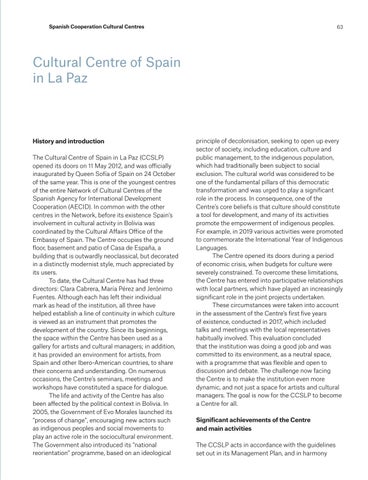Spanish Cooperation Cultural Centres
63
Cultural Centre of Spain in La Paz
History and introduction The Cultural Centre of Spain in La Paz (CCSLP) opened its doors on 11 May 2012, and was officially inaugurated by Queen Sofía of Spain on 24 October of the same year. This is one of the youngest centres of the entire Network of Cultural Centres of the Spanish Agency for International Development Cooperation (AECID). In common with the other centres in the Network, before its existence Spain’s involvement in cultural activity in Bolivia was coordinated by the Cultural Affairs Office of the Embassy of Spain. The Centre occupies the ground floor, basement and patio of Casa de España, a building that is outwardly neoclassical, but decorated in a distinctly modernist style, much appreciated by its users. To date, the Cultural Centre has had three directors: Clara Cabrera, María Pérez and Jerónimo Fuentes. Although each has left their individual mark as head of the institution, all three have helped establish a line of continuity in which culture is viewed as an instrument that promotes the development of the country. Since its beginnings, the space within the Centre has been used as a gallery for artists and cultural managers; in addition, it has provided an environment for artists, from Spain and other Ibero-American countries, to share their concerns and understanding. On numerous occasions, the Centre’s seminars, meetings and workshops have constituted a space for dialogue. The life and activity of the Centre has also been affected by the political context in Bolivia. In 2005, the Government of Evo Morales launched its “process of change”, encouraging new actors such as indigenous peoples and social movements to play an active role in the sociocultural environment. The Government also introduced its “national reorientation” programme, based on an ideological
principle of decolonisation, seeking to open up every sector of society, including education, culture and public management, to the indigenous population, which had traditionally been subject to social exclusion. The cultural world was considered to be one of the fundamental pillars of this democratic transformation and was urged to play a significant role in the process. In consequence, one of the Centre’s core beliefs is that culture should constitute a tool for development, and many of its activities promote the empowerment of indigenous peoples. For example, in 2019 various activities were promoted to commemorate the International Year of Indigenous Languages. The Centre opened its doors during a period of economic crisis, when budgets for culture were severely constrained. To overcome these limitations, the Centre has entered into participative relationships with local partners, which have played an increasingly significant role in the joint projects undertaken. These circumstances were taken into account in the assessment of the Centre’s first five years of existence, conducted in 2017, which included talks and meetings with the local representatives habitually involved. This evaluation concluded that the institution was doing a good job and was committed to its environment, as a neutral space, with a programme that was flexible and open to discussion and debate. The challenge now facing the Centre is to make the institution even more dynamic, and not just a space for artists and cultural managers. The goal is now for the CCSLP to become a Centre for all. Significant achievements of the Centre and main activities The CCSLP acts in accordance with the guidelines set out in its Management Plan, and in harmony
